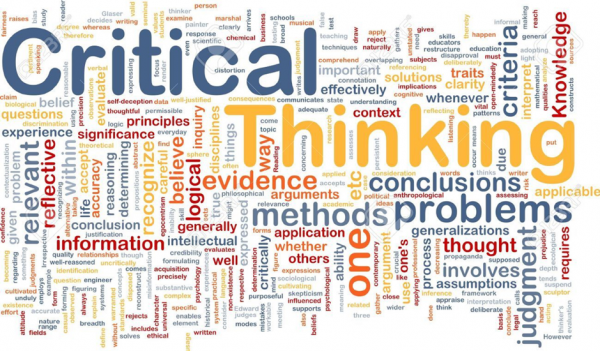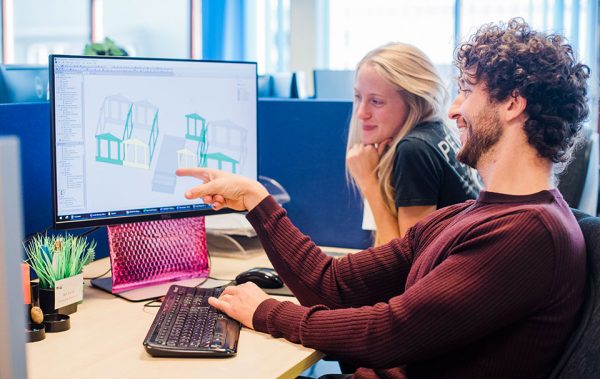Critical thinking is crucial
Industry matters
 When Senior Engineer Alec Ovens was interviewed by Ground & Water prior to joining the company, he was asked to prepare a short presentation on a current issue affecting the Geotechnical and Environmental industry. Alec chose ‘critical thinking’.
When Senior Engineer Alec Ovens was interviewed by Ground & Water prior to joining the company, he was asked to prepare a short presentation on a current issue affecting the Geotechnical and Environmental industry. Alec chose ‘critical thinking’.
Naturally when considering my options at that interview, there were some of the more ‘mainstream’ headlines – sustainability, emerging contaminants – that immediately sprang to mind. However, I opted to look at critical thinking and the role it plays in our industry when it comes to analysing results and reporting on our conclusions. Critical thinking is something used throughout your university degree and somewhat naturally side-lined as you move into the world of work.
During the second half of 2021, the Society of Brownfield Risk Assessment (SoBRA) Early Careers Working Group, is hosting a series of webinars – sponsored by Ground & Water – on the key areas of risk assessment. The topic for August was Controlled Waters, however the speaker took the first 10 minutes, reiterating throughout, a call for the need for more critical thinking to be employed within the industry.
So, what is critical thinking? According to the Oxford English Dictionary, it is: ‘the process of analysing information in an objective way in order to make a judgement about it.’ This is therefore a two-part process; the analysis of information and the making of judgements.

At university, lecturers can often be heard asking ‘but what does the data show?’ Or… ‘but why could this be the case?’, when students read around the subject in order to get a greater understanding. This process is important for the understanding of the subject and enables critical thinking to take place. As graduates move into a professional environment, there is often the assumption that they should know what to do; but considering the time pressures within a corporate environment, the reading around the subject often reduces. In order to provide a consistent approach, companies often look for ways to streamline analysis through spreadsheets etc. Unfortunately this can lead to tables being filled out without the following questions being asked: What are the results showing me? Does the data look correct? Was the data obtained correctly in the field? Ground & Water believes it is vitally important to consider these questions before taking the raw data at face value.
The second part of the definition talks about making a judgement from the information obtained. In the UK there are a vast numbers of guidance documents that can be used within assessments. For contaminated land, there are no fewer than nine suppliers of guidance. So ensuring you understand where this data has come from and what you intend to do with it, is even more important, especially when it comes to risk assessments. Some guidance is based on scientific data, whereas other types are empirical in nature and therefore the uncertainties need to be fully understood prior to making recommendations. Another simple consideration is whether the guidance is the most recent or has it been superseded or withdrawn.
 An example of understanding data, and the need for critical thinking, can be seen with groundwater remediation. The Environment Agency P20 remedial targets spreadsheet, has twenty separate parameters in order to calculate the final output. If the user applied each parameter with a factor of 10 conservatism, by the time you receive your final value you could be at x1040 conservatism and therefore the data is not likely to be appropriate for the site. While the industry is moving towards automated systems where graduates are largely filling in data on various software, it is important to ensure that the understanding of what the software is doing is also present. The time saved by these semi-automated systems should be used to ensure that the assessments are checked and that sensible outputs are achieved. In order for the industry to maintain a high level of competence, the understanding of the data and assessment in early careers is as important as the understanding of how to use any spreadsheet or software.
An example of understanding data, and the need for critical thinking, can be seen with groundwater remediation. The Environment Agency P20 remedial targets spreadsheet, has twenty separate parameters in order to calculate the final output. If the user applied each parameter with a factor of 10 conservatism, by the time you receive your final value you could be at x1040 conservatism and therefore the data is not likely to be appropriate for the site. While the industry is moving towards automated systems where graduates are largely filling in data on various software, it is important to ensure that the understanding of what the software is doing is also present. The time saved by these semi-automated systems should be used to ensure that the assessments are checked and that sensible outputs are achieved. In order for the industry to maintain a high level of competence, the understanding of the data and assessment in early careers is as important as the understanding of how to use any spreadsheet or software.
Ground & Water actively works to ensure the skill of critical thinking isn’t swallowed up in the name of efficiency, by hosting weekly industry focused CPD sessions and encouraging the team to really analyse results and question the data that’s in front of them. The company champions curiosity and this is reflected in our findings and conclusions and in the way we work.
